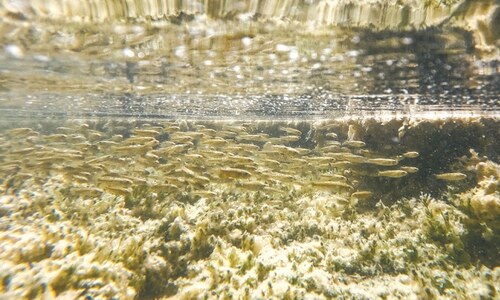DUBAI: Fearing becoming targets as the Middle East conflict spreads, wealthy Gulf states are shoring up ties with Iran and giving assurances they won’t facilitate attacks by Israel, according to analysts.
Traditionally Western allies, the resource-rich monarchies have grown closer to Iran after a long period of tension with their neighbour across the Gulf.
As Israel says it is preparing a response to Iran’s 200-missile barrage on Oct 1, a rapid series of diplomatic exchanges shows the Gulf is keen to stress its neutrality in the conflict, experts said.
“Gulf states are trying to leverage improved relations with Iran to avoid being caught in the middle of an Israel-Iran escalation,” said Anna Jacobs of the International Crisis Group think tank.
Only hours after Iran’s missile strike, the second this year by Tehran on Israel, recently elected Iranian President Masoud Pezeshkian was in Doha, where he met Qatar’s emir and Saudi Arabia’s foreign minister.
And this week, as Israel warned its response to Iran would be “deadly, precise and surprising”, Iran’s top diplomat visited Saudi Arabia and Qatar.
According to experts, Gulf states have pledged not to let Israel use their airspace for attacks on Iran.
“Gulf states are just trying to stay out of it by making sure Israel doesn’t use any of their airspace for any attacks and reassuring Iran of that fact,” Jacobs said.
Ali Shihabi, a Saudi analyst close to the government, echoed this view ahead of Wednesday’s visit by Iran’s foreign minister, Abbas Araghchi.
“Saudi Arabia will confirm that it will not allow any party to use its airspace to attack the other and will also agree to any call for a ceasefire in Lebanon or Gaza,” he said before Araghchi’s talks.
Balancing act
As threats grow of a showdown between Iran and Israel — which has diplomatic relations with the United Arab Emirates and Bahrain, but no other Gulf countries — so have warnings by Iran-backed groups.
Saudi Arabia and the UAE have both been attacked and threatened by Iran-backed groups in the past, including Yemen’s Houthi rebels who temporarily halved Saudi crude production in 2019.
Last month, the leader of Kataeb Sayyid al-Shuhada, one of Iraq’s pro-Iran factions, threatened the UAE with direct attacks in the event of a regional war.
In a statement on social media platform X, Abu Ala al-Walai accused the UAE of being a “Zionist” proxy in the Gulf and said it would be “the first target... in the event of an all-out war”.
Another major threat could come from emboldened Houthis, who have launched drones and missiles at Israel in recent months over the bombardment in Gaza.
Although they have yet to warn of direct attacks, the Iran-supported Houthis have hardened their rhetoric against neighbouring Saudi Arabia, which has headed a coalition against them since 2015.
“Houthi threats against Saudi Arabia should be taken seriously, rather than dismissed as empty rhetoric,” said US-based Yemen analyst Mohammed al-Basha.
According to Torbjorn Soltvedt of the risk intelligence firm Verisk Maplecroft, the main concern for Gulf states would be that an Iranian retaliation could extend to attacks against their energy infrastructure.
“The Gulf states face an increasingly difficult balancing act. So far they have managed to keep escalating regional conflict at arm’s length by remaining as neutral as possible.”
Heightened security
Arab states have long been an integral part of Washington’s security architecture in the region, hosting several Western military bases.
The US Navy’s Fifth Fleet, which oversees the region, is based in Bahrain, which also hosts a British naval facility, and the forward HQ of America’s Central Command is at Qatar’s sprawling Al Udeid Air Base. The UAE, which hosts US aircraft and a French military base, was designated by Washington last month as a major US defence partner. Although Iran’s missile attack drew condemnation from the West, Arab states refrained from commenting.
Published in Dawn, October 12th, 2024














































Dear visitor, the comments section is undergoing an overhaul and will return soon.